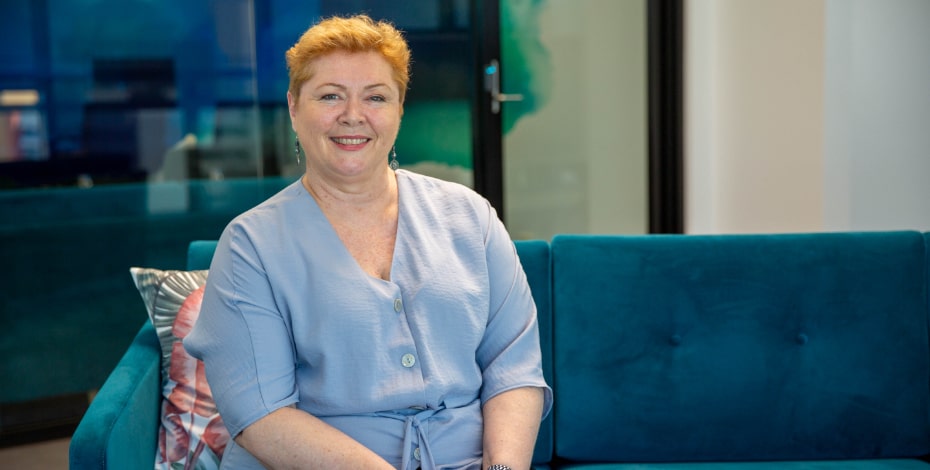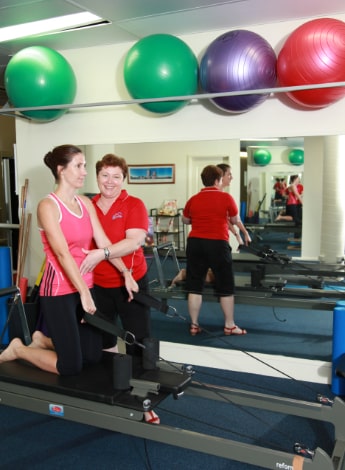
It’s a long way to the top in the Top End

As the Chief Allied Health Advisor in the Northern Territory, Heather Malcolm has had to weather the challenges of the COVID-19 pandemic as well as put in place key strategies to attract practitioners to the Top End—and keep them there.
By her own admission, Heather Malcolm is particularly good at taking complex issues, unpacking them and putting them back together with a critical eye for what they will mean for Northern Territory (NT) Health.
And as the Territory’s Chief Allied Health Advisor, it’s a skill that is in very much demand.
Heather says this ability is deeply rooted in her training as a physiotherapist at the South Australian Institute of Technology. She graduated in 1985 and began her physiotherapy career at Royal Adelaide Hospital.
Heather believes her reasoning and analytical expertise come from her training and her subsequent work in treating clients with complex health issues while in the public system, and later as a private practitioner in Sydney and in the NT.
These are skills she uses today in overseeing strategic workforce development and in liaising with prominent bodies such as the APA, Occupational Therapy Australia, Speech Pathology Australia and Indigenous Allied Health Australia, on behalf of NT Health.
‘I think physios make very good project managers simply through applying those analytical-type skills,’ Heather says.
‘We’re really good at thinking outside of the box and also in working as part of a broader multidisciplinary team.’
With a background in clinical quality, Heather’s passion took her into the NT Chief Allied Health Advisor role in the months leading up to the COVID-19 pandemic last year.
She had already been working for the Department of Health for seven years, first on a Health Workforce Australia program before moving into patient safety and quality.
Heather has worked alongside two previous allied health advisors; first speech pathologist Renae Moore and then occupational therapist Nicole O’Reilly.
One of Heather’s first tasks was to engage with key stakeholders within the public sector and externally. Then she found herself having to navigate the unfolding pandemic landscape.
In the early stages of the pandemic, around March and April last year, Heather says she assisted in the necessary identification and upskilling of staff to manage the anticipated patient load.
Her remit included supporting allied health managers to plan the secondment of physiotherapists and other health professionals from community allied health into the hospitals.
She also facilitated weekly meetings between the Department of Health and the two NT health services to keep abreast of COVID-19 developments in the Territory.
Having a seat on the National Allied Health Advisors and Chiefs Committee gave Heather an understanding of what was happening around the country which, in turn, informed her decisions about the local response.
‘We had good liaison between the public community and acute services, so there were some silver linings in working closely together,’ Heather says.
‘We were able to navigate government processes a lot more efficiently. In the department here, we had daily huddles, and things were changing pretty frequently so communication was crucial.
‘We had to manage Commonwealth biosecurity zones, where all the Aboriginal communities were locked down, and NT border controls, dealing with the impacts of both.
'That affected our outreach allied health services, which provide fly in-fly out or drive in-drive out services to remote communities. Specialist medical services couldn’t go out into the communities either, so we had a big increase in the use of telehealth.’
More recently Heather has been appointed to the dual role of Functional Lead for NT Health Virtual Care Strategy, separate to her allied health advisor role, after being involved in a review of the telehealth services in the Territory during COVID-19.

The review examined the changing culture around implementation of telehealth, whether the increased service was sustainable and explored how to standardise telehealth use across different models of care in different regions.
Reflecting on her tasks during the pandemic, Heather says she prioritised relationships with universities including Flinders (South Australia and NT) and Charles Darwin (NT) to ensure student placements would continue despite the introduction of strict rules around social distancing and the wearing of personal protective equipment.
Realising that many students would not be able to graduate if they were unable to complete their final year clinical placement, Heather worked to help support clinicians in the hospital setting to continue student placements.
For her efforts, Heather received the Flinders Champion Collaborator Award in December.
Part of her motivation to keep student placements on track was to continue the exposure of students to work and life in the Territory so they consider making it their home.
One of the Territory’s biggest challenges is the retention of its health workforce, and to stem the flow of qualified professionals leaving and taking their knowledge to metropolitan centres or overseas.
‘We have an attraction, recruitment and retention action plan that we’re working on that looks at addressing the workforce shortages in the NT,’ Heather says.
‘At the moment we’ve got a critical shortage of occupational therapists, psychologists, social workers and sonographers.
‘In a small jurisdiction like the NT, I also offer leadership and advocacy for the pharmacy and medical imaging professions, although they’re not typically thought of as allied health.
‘We have shortages of experienced physiotherapists. We find more junior physios and new graduates tend to apply for our positions.
'Our challenge for most of the allied health professions is to attract more experienced staff who can cope with the complexity of our patient load; they might be working on their own in remote practice or in a multidisciplinary team where they might be the sole physio.
‘Another challenge around retention is that as practitioners advance in their careers, they want to gain specialist skills, often attracted to move interstate to achieve this, like I had to do.
'I moved to Sydney to do my Masters as at the time there was no capacity to do this locally.
‘Professional development and specialisation is challenging up here as you really need those mentors and study networks around you.
'Allied health staff retention is about five years in NT… we’ve been advocating for local education providers to help grow our own workforce, and Charles Darwin University has recently commenced occupational therapy, speech pathology and nutrition courses, and the university is planning more post- graduate courses.
'We also work with other universities to optimise clinical placements.’
Heather says her work now is to review the lessons learned from the pandemic and also to consider allied health services across the care continuum, developing preventative models of care to keep people out of hospital and strengthening the generalist allied health and assistant workforces to improve integration of care.
‘When you look at the impact that digital health is having on health, it’s a real time of change. There are so many apps and wearables to help physios in the preventative health space.
'And there is plenty happening around algorithms, machine-based learning for clinical decision-making support, and around virtual reality. I think it’s a really exciting time for innovation.’
© Copyright 2025 by Australian Physiotherapy Association. All rights reserved.





